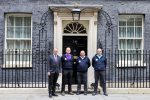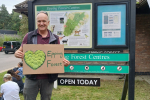The Environment, Food, and Rural Affairs Select Committee, on which MP for Penrith and The Border, Dr Neil Hudson, sits held the final evidence session for its Rural Mental Health Inquiry, which was triggered by the Cumbrian MP.
Dr Hudson has fought for an improved and joined up approach to rural mental health provision since his first speech in the House of Commons and since being elected to the EFRA Select Committee has brought forward an official Inquiry into the issue. The Committee will now start work on writing an official Report which will go before the Secretary of State for Environment, Food and Rural Affairs in due course.
Questions were spread across two sessions, the first addressing NHS staff and the second Government Ministers.
Dr Hudson focussed on shock factors such as extreme weather events, flooding, and disease outbreaks among livestock; and the impact they have on people’s mental health. Not only regarding the resultant trauma but also through the stress, anxiety and worrying that comes in anticipation of the increasingly frequent shock events resulting from climate change.
He also asked about increasing mental health awareness and training among agricultural industries, such as the veterinary sector which Dr Hudson has many years of professional experience, where incidences of ill mental health and tragically suicide are far above the national average. Again Dr Hudson pressed for joined up thinking, informed by previous evidence sessions where multiple attendees asked for better communication between DEFRA, the NHS and third sector organisations.
Among those giving evidence was Samantha Allen, Chief Executive at North Cumbria Integrated Care Board – responsible for healthcare across Penrith and The Border and able to give some local flavour to proceedings.
Speaking afterwards, Dr Neil Hudson MP, said:
“It was a real privilege to question Ministers and health leaders on a range of issues such as mental first aid training, joined up community resilience and the shock events that disproportionately impact remote communities such as ours in Penrith and The Border. I’d like to extend my gratitude to all those who gave evidence.
“This was our final evidence session in what has been a really productive process so far. I’d like to thank my friends and colleagues on the Committee for allowing me to trigger an Inquiry into Rural Mental Health and for working so well collegiately to help affect real change throughout the nation’s more remote communities.
“I’ve fought passionately on the issue of Rural Mental Health since I raised it in my maiden speech, and I look forward to our Committee publishing our Inquiry Report in due course. From shock factors and specific challenges for rural professions to rural isolation and poor access to services – rural communities face a uniquely challenging package of mental health issues and I hope this Inquiry can be a positive first step, shining a light on the long-overlooked problems and working towards positive proactive solutions for those who may be suffering.”
Panellists being quizzed by the Committee include: Claire Murdoch, National Director for Mental Health for NHS England; Samantha Allen, Chief Executive of the North East and North Cumbria Integrated Care Board; Gillian Keegan MP, Minister of State for Care and Mental Health; Zoe Seager PhD, Deputy Director for Mental Health Policy, Strategy and Delivery; The Rt Hon Lord Benyon, Parliamentary Under Secretary of State, Minister for Rural Affairs, access to nature and Biosecurity; Jonathan Baker, Deputy Director, Future Farming and Countryside Programme.




